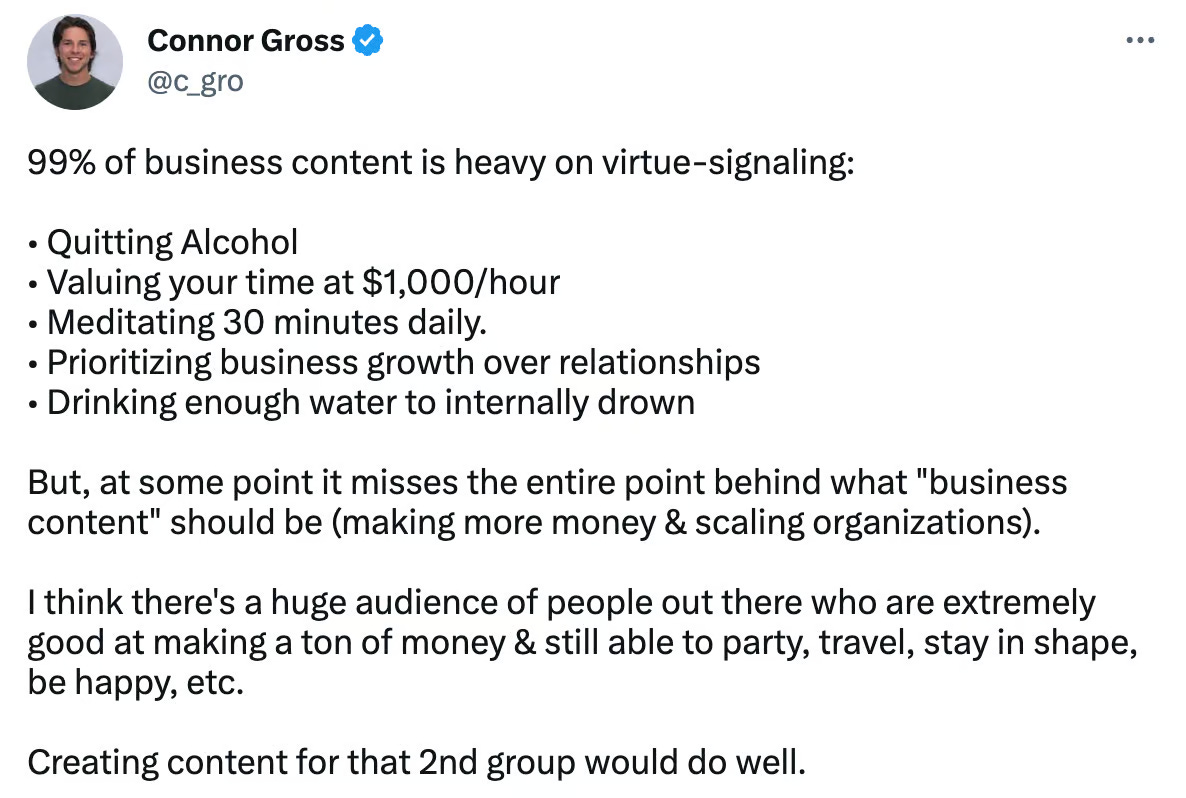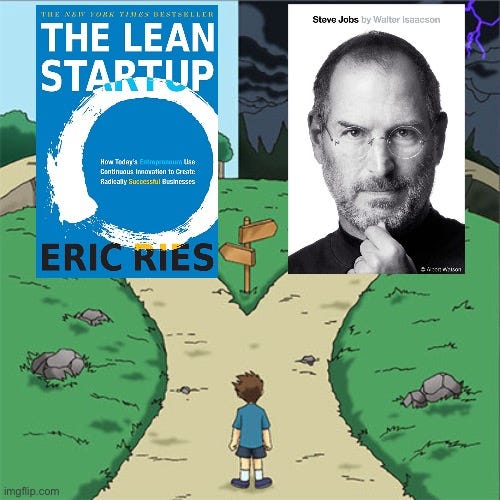The Long Game 153: Health Isn't Just Biomarkers, Lean Startups, Trying to Organize Everything
🥊 Silicon Valley’s Civil War, El Salvador, Rucking, Gym Mistakes, Teachers, Duolingo, and Much More!
Hi there, it’s Mehdi Yacoubi, co-founder at Vital, and this is The Long Game Newsletter. To receive it in your inbox each week, subscribe here:
TLG is back after a few weeks. I’m currently exploring other ways of creating content, especially in the video format. More on that soon!
In this episode, we explore:
Health isn’t just biomarkers
You can be successful without being insufferable
Trying to organize everything
Lean startup or not?
Silicon Valley’s civil war
Let’s dive in!
🥑 Health
🧬 Health Isn’t Just Biomarkers
Noah Ryan managed to put into words perfectly a topic we touched on quite a bit over the last few weeks on here.
Health isn’t just biomarkers. It’s relationships, experiences, fulfillment, alignment. Those require living outside the lines.
As the trend of over-optimization is growing in the health space, this paragraph is useful and blends well the ideas of improving your health, learning things and not becoming neurotic about it.
Let me clarify: I’m not neurotic about health.
I’m just informed.
People confuse cognizance for neuroticism. Just because something is “unhealthy” doesn’t mean it’s off limits.
I know some of the stuff I do is bad for my health. Most people are willfully ignorant and decide to remain uninformed. Not my style
I know the risk profile of any vice i partake (alcohol, sleep deprivation, junk food)
I also know how to mitigate damage while still living the life I want to live (some parts being inherently unhealthy)
My goal is not to be perfect. It’s to be resilient.
Dismissing health education because you don’t want to be an “optimizor” usually signals you’re too lazy/unable to research health topics
The reason extreme routines are so popular is because they seemingly remove the need to think for yourself and understand what “optimal” truly means in your individual context.
🌱 Wellness
🤡 You Can Be Successful Without Being Insufferable
You might feel this whole edition of TLG follows a similar theme, and after editing it, I would agree.
This piece is a good reminder, especially these days.
Is it really an all-or-nothing pursuit?
I’ve written God-knows how many blog posts around the general idea of opportunity costs and why it’s important to invest in experiences early and often, but today, I want to take this idea a step further.
Yes, you should invest in experiences, but as Perkins showed above, investing in experiences doesn’t have to come at the expense of your career. Look at the boss’s reply as well as Bill’s observation when Jason returned:
“You came here to make millions. Your earning power is going to happen! Do you think you’ll only make 18 thousand a year for the rest of your life?”
“When he (Jason) came back a few months later, there was no discernible difference between his income and mine—but the pictures and stories of his experiences showed that he was infinitely richer for having gone…”
So what are the takeaways here?
If you are confident that your earning power will grow exponentially over time, saving every single penny in your early years is a fool’s errand.
If you are a competent, hard-working individual, taking a brief hiatus to explore a side quest or two won’t derail your career.
The truth is, if you’re actually a high performer, and if you’re confident that you will excel in your career, you don’t have to neglect other areas of your life to reach your goals. You’ll reach the same destination, but one journey will be a hell of a lot more fun. It quite literally makes sense to spend some of your early-career earnings on non-work pursuits. Plus, you’ll be a hell of a lot more interesting. Seriously, no one likes the boner at a cocktail party who can’t maintain a conversation without referencing their job or entrepreneurial aspirations at least four times.
So why is this “Grind over everything” mindset so popular? Maybe this is a controversial take, but I think it’s a heavy dose of copium self-administered and propagated by folks who couldn’t achieve success unless they neglected other areas of their lives.
It’s easier to tell yourself that you are better than others because you made sacrifices that they didn’t, rather than admitting that it’s actually quite possible for plenty of people to have it both ways.
Let’s be real, getting rich after spending 10 years doing nothing except “grinding” isn’t impressive. If you fully committed to anything for 10 years and the end result was anything short of a home run, that would be an abject failure. “Success,” financially speaking, should be the default outcome.
You know what’s actually impressive? Learning a musical instrument, fostering deep relationships, traveling somewhere new, picking up a new language, mastering a martial art, and/or developing a decent sense of humor, all while leading a lucrative career.
Don’t pay attention to the hustle gurus who have made their “riches” their entire identities. They fall on the left tail of the success bell curve. Instead, look at the folks whose net worths are just one of their many successes. Believe it or not, you can win the money game without giving up everything else along the way.
🧠 Better Thinking
🤯 Getting Overwhelmed and Trying to Organize Everything
It’s very tempting to feel you want to do more, achieve more get more stuff done. That usually leads to an effort to over-engineer things, create complex systems, and use many tools in the process. All that ironically leads mostly to more stress, and more time thinking about the meta-system than the actual tasks at hand.
It’s possible that the only way to find a simplicity that works is to go through the over-engineered phase, though. But I am not sure! What do you think?
Bottom line: Do the thing.
⚡️ Startup Stuff
🏗 Quick MVP or Not?
Flo Crivello tweeted this great meme:
If you’ve been a long-time reader of TLG, you know I touched on this topic a lot. This piece is a good summary:
Of course, startup teaching will always lag behind companies that succeed using a new strategy. We'll see companies break the mold and win before the startup playbook changes. And I think we're already seeing some of those companies emerge today.
Some products have such a devoted user base that they have become memes on Startup Twitter. Among these are Notion, Figma, Airtable, Superhuman, and Discord. All of them are defined by an extremely high quality user experience.
If these products were shipped as MVP's built by stringing together commodity libraries, the founders might have concluded they were just in a bad market, then gone on to build more MVP's forever.
But taking Notion as an example, their story couldn't be further from the norm. If I understand correctly, Notion moved their team away from Silicon Valley to Japan and spent a year obsessing over their product before launching their v1. This led them to a highly differentiated product that people are obsessed with. They can reduce a lot of spending on advertising and sales, since they naturally grow via word of mouth.
Notion isn't totally throwing out the rules. They started by getting a small group of people to love them. They shipped an MVP and iterated. But they chose a much higher quality bar for their MVP than most founders do today.
Pair with: First 1,000 users of Notion
📚 What I Read
🥊 Silicon Valley’s Civil War
Tech’s leadership is splitting into two elites—and the battle between them will shape America’s future.
With an estimated net worth of over $1 billion, Marc Andreessen, co-founder of the Netscape browser and venture capital firm Andreessen Horowitz, is far from an everyman. And yet Andreessen’s biting criticisms of the “entrenched oligarchic structure of the present regime” have made him one of the surprising figureheads of a growing anti-elite movement that could—depending on which side wins out—reshape America’s political and social future.
Andreessen is one of the more prominent names in a new class of tech wealth that includes figures like Elon Musk and Peter Thiel whose political vision and methods conflict both with dot-com tech titans like Bill Gates and Pierre Omidyar, as well as with those of old world industry and media, like Rupert Murdoch and Ted Turner. While it might seem strange, given his own position of power, for someone like Andreessen to criticize elites, the truth is that elites have cliques, just like the rest of us. And in the cafeteria of America’s billionaires, Andreessen and his peers are hurling food and spoiling for a fight, while the incumbents are calling in favors at the State Department and New York Times.
📚 The Case Against (Most) Books
Taking opportunity costs seriously in the quest for knowledge.
Many effective altruists and rationalists oppose reading books. This position is easily mocked, but as someone who is familiar with the way academia and publishing work, I think it has a lot to recommend to it. According to the great moral leader Sam Bankman-Fried,
I don’t want to say no book is ever worth reading, but I actually do believe something pretty close to that…If you wrote a book, you fucked up, and it should have been a six-paragraph blog post.
Ideally, one would like to think that if someone has written a 300-page book, it means that they have 300 pages worth of things to say. My experience is that is rarely the case. People generally have an idea that can be expressed in terms much shorter than that, but extending your idea into a book looks impressive on a CV and gets you invited on TV shows and podcasts.
To take one example, the last book I finished was David Sinclair’s Lifespan. It has three parts, and the last of them is nothing but two chapters about his political and social views, where he addresses issues that are ancillary to conquering aging like what’s going to happen to social security and the impact of a growing population on global warming. He also comes out for universal healthcare, legalized euthanasia, and more income equality.
🚔 I wanted to be a teacher but they made me a cop
The conundrum in every classroom.
One student cornered me after class to tell me he’s been absent so much because he’s both getting divorced and starting a business. (“Please don’t worry about it,” I said.) Another time, a student apologized for missing class; she had just found out about a mass shooting near her home. (“Please don’t worry about it.”) Once, I listened, aghast, to a student explain that she’d unfortunately have to miss class to be at her child’s life-saving surgery. (“PLEASE don’t worry about it!!”)
Until recently, this all seemed unfortunate but sensible. Students want points, I have the points, and so they’ll divulge whatever details they think will get me to cough those points up. Some students are probably lying, and part of my job is to tell the fake diarrheas and divorces from the real ones.
But as I enter my final grades and finish up my teaching job at Columbia, I’m struck by a strange thought: what am I doing? Why am I the guy that people tell when they have digestive distress? Why do we have an education system where it’s reasonable for students to debase themselves in exchange for made-up points?
🦉 How Much Can Duolingo Teach Us?
The company’s founder, Luis von Ahn, believes that artificial intelligence is going to make computers better teachers than humans.
Attracting people and getting them to stay is, in some ways, Duolingo’s core business. When you begin a course on the app, you are greeted by Duo and some basic vocabulary. Then a collection of cartoon characters—Lily, a sarcastic, purple-haired teen; Eddy, whom the company’s principal product manager, Edwin Bodge, described to me as a “kind of goofy, weird gym bro”—speak sentences to you, and prompt you to translate them. The app dings when you get something right, awards you points, badges, and trophies, and moves you along a winding path through a series of increasingly challenging levels. You are reminded, repeatedly, to finish at least one lesson each day, in order to keep your streak going.
Von Ahn’s original concept for Duolingo—that people studying foreign languages could practice by translating existing texts from the Web—relied on other users to rate the results and suggest improvements. The hope was that this process would produce translations worth paying for. BuzzFeed became Duolingo’s first client, in October, 2013, announcing that, as part of its expansion into Portuguese, Spanish, and French, it would “have Duolingo’s students translate the best of BuzzFeed into new languages while localizing BuzzFeed’s iconic tone.”
Pair with: How Duolingo reignited user growth
🍭 Brain Food
❓ Ne quid nimis
“Call it sex negativity or common sense, there's backlash around the corner.” Some food for thought on an important topic.
A counter-wave is inevitable. Generational cycles, you know how it goes. But I argue this pushback against sex positivity, if conducted with calibration, could restore meaning and health to our currently maladaptive society. Since the 1960s, there has been an aggressive effort to divorce sex from consequence. The general idea among this type of free love movement is that sex can be rule-free. A bulk of feminist polemic and similar progressive activism has attempted to socially engineer this dangerous fiction. It’s a fiction that pretends that one can divorce sex from responsibility, risk assessment, power, children, love, tyranny, that sort of thing.
Instead of consequence being factored into these dynamics, the gold standard is then consent. So you can have adults engaging in objectively dysgenic behavior but as long as they both agree to it, the conversation simply ends there. One could argue this is the natural product of postmodernist sex philosophy.
Postmodernists believe that there is no canonical way to explain or understand phenomena. They don’t believe in an objective world because everything, to a postmodernist, is a function of language and everything, to them, is language-mediated. You will notice the most egregious forms of this style of intellectual dishonesty among the gender studies departments of our world, for example. It’s extraordinarily cynical. Naturally, postmodernism shuns necessary categories of right and wrong, good and bad, light and dark, healthy and sick. This extends to our culture of dating, partner selection, and self-actualization today.
After the 1960s, sex was forced out of the realm of the sacred to the domain of the marketplace. And the idea was that the fluidity of the market would sort out the problems, like high status males hoarding most females to low status males becoming risk tolerant and prone to isolation or violence or both. But it didn’t. Now young people are gradually expressing their contempt for these conditions. They may not articulate their unease in harsh fashion as, say, I do. But they know what’s going on.
Pair with: Let's Have An Honest Conversation About Only Fans & This is what hook up culture is doing to you.. the truth.
🎥 What I’m Watching
🇸🇻 How the World’s Most Dangerous Country Solved Murder
⚠️ 5 Worst Novice Training Mistakes
Some important lessons for my lifting friends.
🔧 The Tool of the Week
🎒 Rucking
As we got a daughter 4 months ago, time management took a whole different meaning. I managed to stick to the gym and even progress quite a bit, but I completely stopped most of the cardio I was doing except for the walks. And walking is great, I love it, but I was looking for something a bit more intense, and most importantly without adding time on top of the gym nor the walks (why not less gym, you might ask: because I love it and I have specific goals I want to reach on that front.)
So I think the best option is to add a heavy bag to some of the walks to get the heart rate up!
🪐 Quote I’m Pondering
The road to building a successful business is paved with countless obstacles and setbacks. It's not for the faint-hearted, but those who persevere and believe in their vision are the ones who ultimately succeed.
— James Dyson
👋 EndNote
Thanks for reading!
If you like The Long Game, please share it on social media or forward this email to someone who might enjoy it. You can also “like” this newsletter by clicking the ❤️ just below, which helps me get visibility on Substack.
Until next week,
Mehdi Yacoubi






